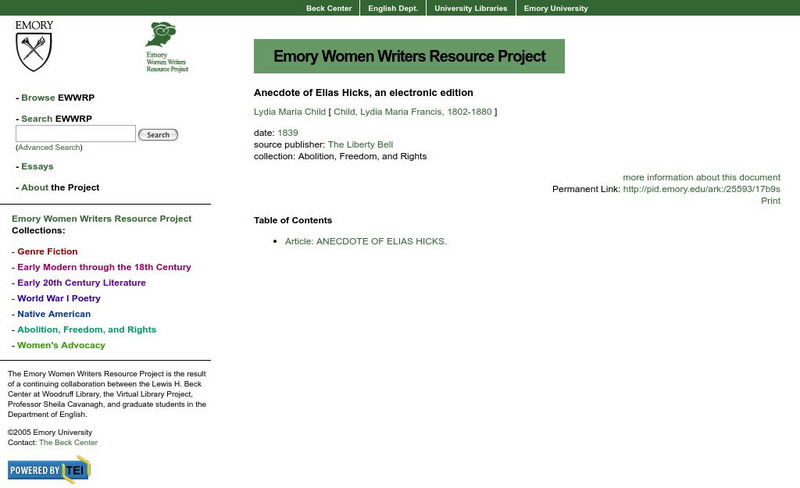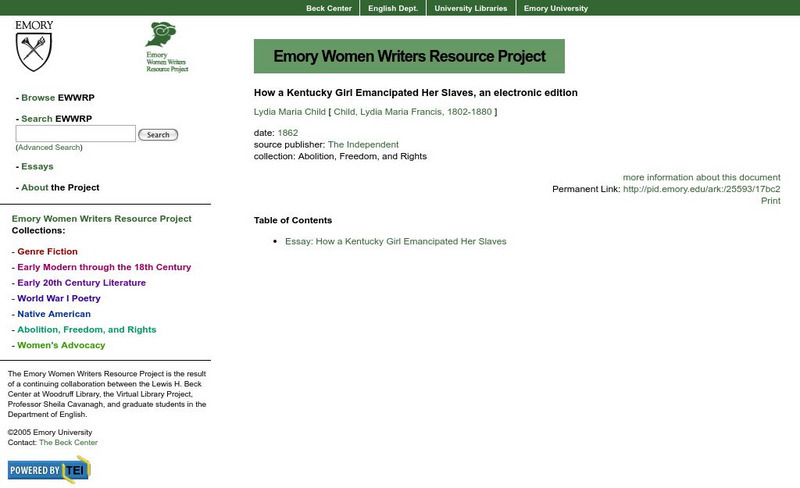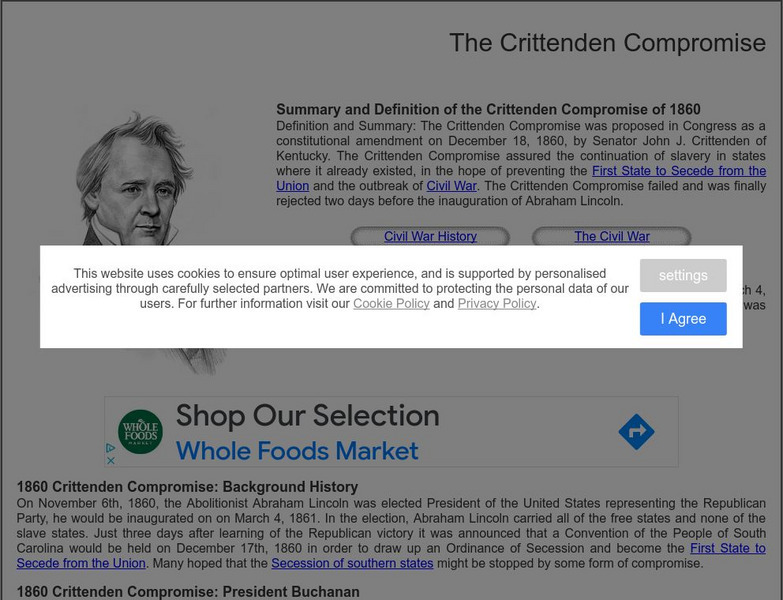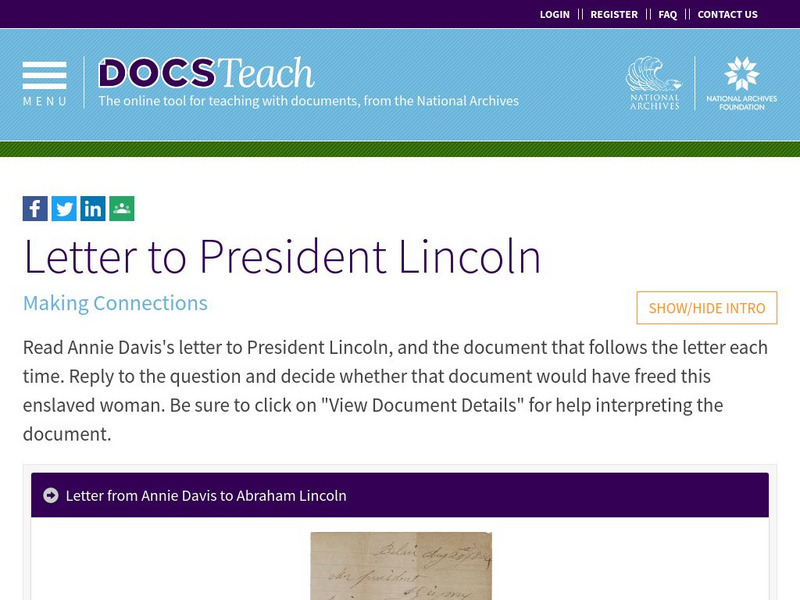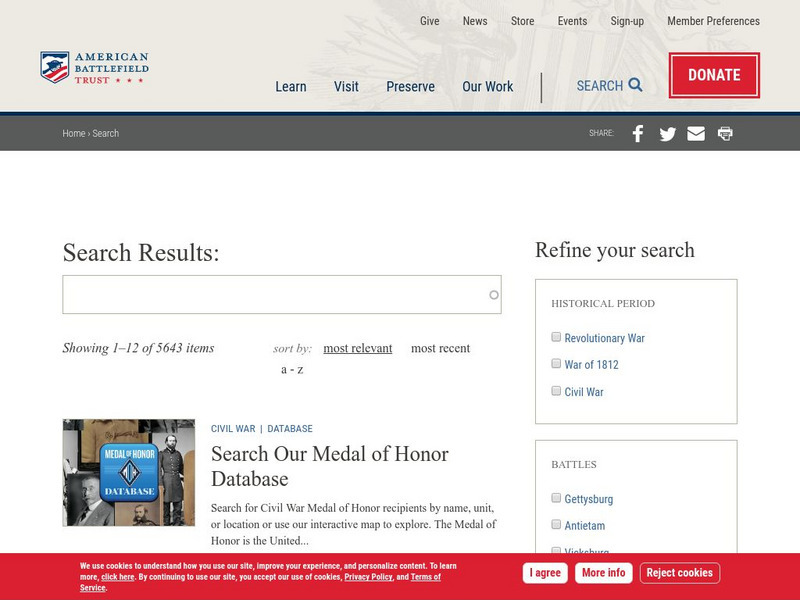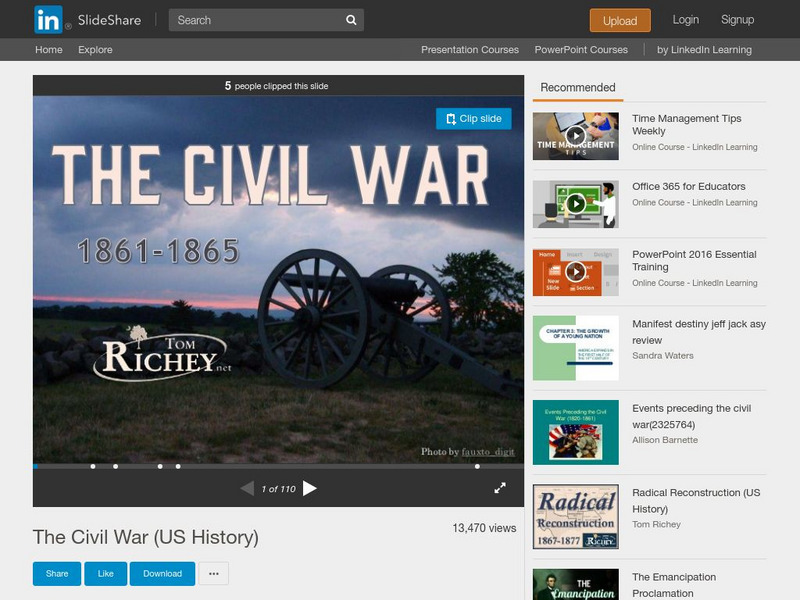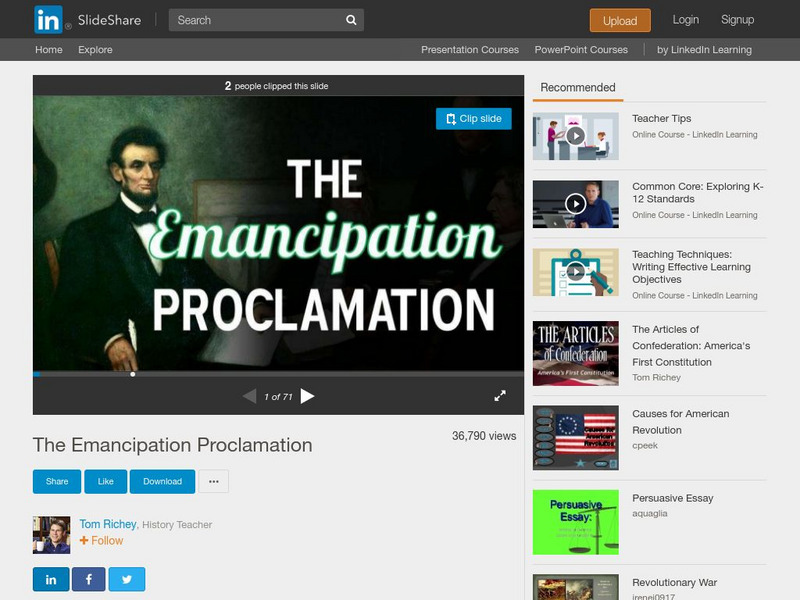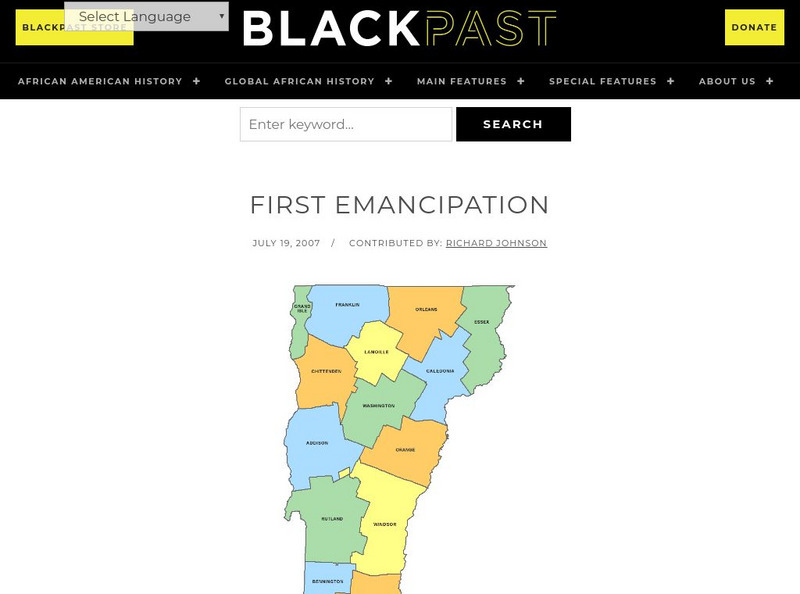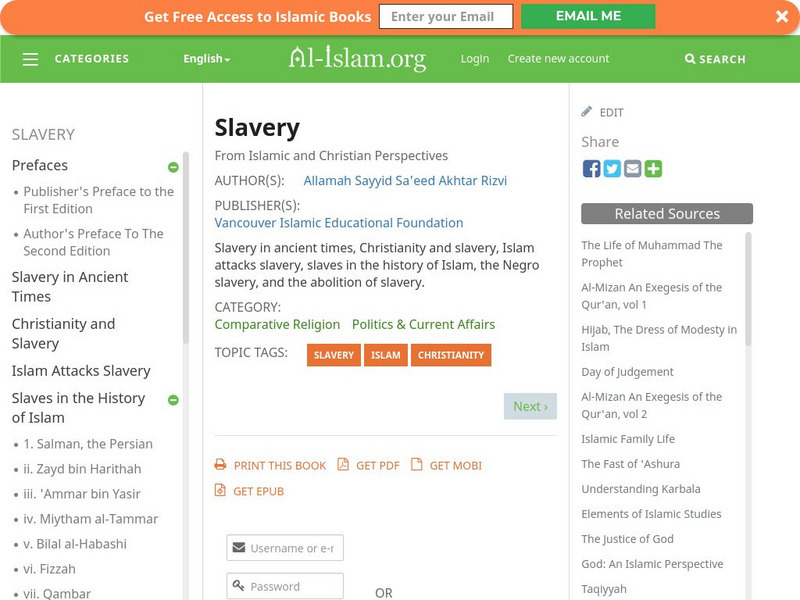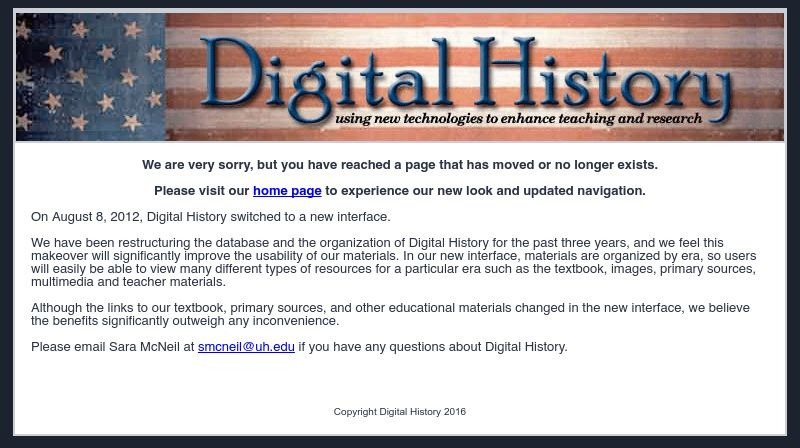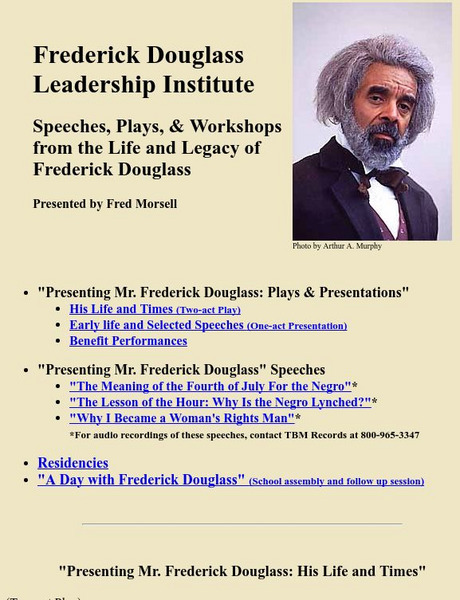Sam Houston State University
Modern European History: Declaration of Alexander Ii Emancipating the Serfs
This site contains the official document of the emancipation of the serfs by Alexander II in 1861. From the book, Readings in Modern European History, edited by James Robinson and Charles Beard, printed in 1908.
US Government Publishing Office
Ben's Guide to u.s. Government: About the Emancipation Proclamation
Ben's Guide is a fun way to present U.S. Government to students grades K-12. This site presents a history of the Emancipation Proclamation. Links to related sites are available.
Emory University
Lewis H. Beck Center: Lydia Maria Child: Anecdote of Elias Hicks
Here, read the full text of Lydia Child's "Anecdote of Elias Hicks," which tells the story of an abolitionist Quaker. It was originally published in 1839.
Emory University
Lewis H. Beck Center: Child, Lydia: How a Kentucky Girl Emancipated Her Slaves
Download the full text to Lydia Maria Child's "How a Kentucky Girl Emancipated Her Slaves." This account of a woman who freed her slaves was originally written by Lydia Child in 1862 and published in The New York Tribune.
National Women's Hall of Fame
National Women's Hall of Fame: Sojourner Truth
The National Women's Hall of Fame provides a brief biography of the famous abolitionist and former slave, Sojourner Truth.
Library of Virginia
Virginia Memory: Petition From Judith Hope
In this lesson, students examine what grounds Judith Hope, the daughter of a freed slave, used to ask for her freedom.
Independence Hall Association
U.s. History: Free (?) African Americans
Not all African-Americans were slaves in the South. Some were freed by their owners, others escaped, but none had the same rights as free whites. Read about their restrictions that were put into law. Find out about the church...
Siteseen
Siteseen: Civil Conflict: The Crittenden Compromise of 1860
Web page on the Crittenden Compromise of 1860 which assured the continuation of slavery where it already existed in an attempt to appease Southerners and halt secession of Southern states from the Union.
US National Archives
Docsteach: Letter to President Abraham Lincoln From Annie Davis
Students will study a letter from Annie Davis, a woman who was enslaved in Maryland and wrote a letter to President Abraham Lincoln during the Civil War to find out if 'we are free.' The students will decide if she received her freedom...
American Battlefield Trust
American Battlefield Trust: Civil War Lesson Plans: High School
Several lesson plans for high school aged students that are standards-based to help them learn about the Civil War.
Read Works
Read Works: Sojourner Truth, 1864: A Primary Source
[Free Registration/Login Required] ReadWorks features a primary source from the Gilder Lehrman Institute of American History. The primary source features the emancipated slave named Sojourner Truth who worked as an abolitionist and...
Tom Richey
Tom Richey: The Civil War 1861 1865
An extensive collection of slides enhance study of the Civil War in North America. Find illustrated details of the key parts of the war: secession, limited war, turning point, and total war. Consider the probing essay questions also...
Tom Richey
Tom Richey: The Emancipation Proclamation
An engaging PowerPoint presentation provides insight into the events which led to ending slavery in the United States. The slideshow illustrates President Lincoln's approach to the Emancipation Proclamation.
Info Please
Infoplease: Timeline: Key Moments in Black History
A timeline of African-American history from when the first African slaves arrived in Virginia in 1619 up to the present.
Encyclopedia Britannica
Encyclopedia Britannica: 300 Women Who Changed History: Susan B. Anthony
Encyclopaedia Britannica provides a biography of Susan B. Anthony (1820-1906 CE), the reformer and political writer who, with the help of Elizabeth Cady Stanton, founded the National Woman Suffrage Association.
Black Past
Black Past: The First Emancipation
This encyclopedia entry gives interesting information about how the Quakers encouraged legislation that led to the banning of slavery in states in the Northeast by 1820.
Khan Academy
Khan Academy: Ap Us History: 1844 1877: The Civil War: Emancipation Proclamation
Discusses the background to the Emancipation Proclamation and how Abraham Lincoln came to support the abolition of slavery and the difficulties that were encountered around this issue. Explains that it did not apply to all slaves as...
Khan Academy
Khan Academy: Ap Us History: 1844 1877: Reconstruction: Life After Slavery
Discusses what life was like for African Americans who were freed from slavery after the Civil War. Includes questions for students.
Other
Digital Schomburg Images: Slavery
A collection of 41 images depicting African American slaves in the Civil War era from the New York Public Library.
Other
Al Islam: Slavery in Ancient Times
This resource gives a history of slavery from pre-Islamic Times and its continuation under Islam.
Independence Hall Association
U.s. History: The Emancipation Proclamation
The Emancipation Proclamation in 1863 really didn't free a single slave. Read about why that was true, but also find out why Abraham Lincoln felt is was absolutely necessary to make a stand on ending slavery when he did, and how the...
Digital History
Digital History: Antislavery Timeline
A timeline of actions tied to the prohibition of or ending of slavery from the meeting of the Continental Congress in 1774 to John Brown's raid on Harper's Ferry in 1859.
Other
Presentations From the Life of Frederick Douglass
The actor Fred Morsell, a Frederick Douglass reenactor, provides plays about the 19th century civil rights leader as well as other resources about Douglass's life and work.
Sam Houston State University
Shsu: Great Events: Nikolai Turgenieff on the Emacipation of Russian Serfs
This site provides an account by the great Russian writer Turgenev of the emancipation of the serfs. It presents the opposition the proposal met on both sides and discusses some of the consequences of the decision.




